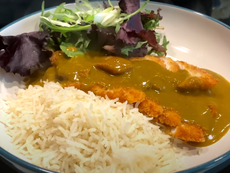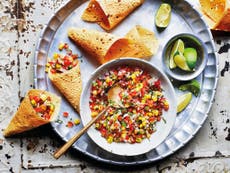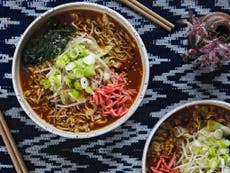The Independent's journalism is supported by our readers. When you purchase through links on our site, we may earn commission.
The fight is on to save the great British curry from coronavirus
In 2016, curry houses were closing at a rate of two a week. Then came Brexit, and the financial impact of restaurant-employed EU citizens returning home was immense

Covid-19 and the pandemic lockdown have had a detrimental impact on restaurants and takeaways up and down the country, not least on Britain’s £5 billion curry industry. Curry house chefs are restructuring their kitchens and menus and continuing to service customers through providers such as Deliveroo or through their own websites to scrap delivery fees. They are also contributing to the Covid-19 effort by donating food to hospitals, NHS workers, other emergency services, the elderly, people who are self-isolating and families who are entitled to free school meals.
Tofozzul Miah, secretary general of the British Bangladeshi Caterers Association (BBCA) and also managing director of Bayleaf Restaurant in London said he hoped all BBCA members would develop their own ways to improve customer experience and save costs. “As a result of the recent pandemic, BBCA has sparked an initiative for our members to voluntarily deliver meals to NHS workers and the elderly across the country,” he told me. “We hope the government will recognise our contribution to the British economy, to diversity and our sustainability.”
In the early 20th century, Britain had become home to around 70,000 South Asians, and a handful of Indian restaurants were opened in London by Bangladeshis. Today, there is a curry house in every town and city, some of which are featured in the latest Michelin Guide. In 2001, in a pivotal speech to the Social Market Foundation, the late Labour MP Robin Cook described chicken tikka masala as “a true British national dish”.
With its growing economic success, the curry industry celebrated with an array of glittering awards ceremonies such as the British Curry Awards, and the growth of numerous affiliated associations. Politicians from all parties have praised the industry and relished its success, from David Cameron and Tony Blair to Sir Vince Cable. Whilst business owners welcomed the attention and acclaim to their trade, they were concerned about the problem of bringing qualified chefs and staff from abroad, and its impact on their trade. The decline in the industry began to become apparent in 2016 when experts suggested that curry houses were closing down at a rate of two a week.
Then came Brexit, and the financial impact of restaurant-employed EU citizens returning home was immense. Some chefs and restaurateurs had previously backed Brexit under government assurance that it would boost their businesses. They had believed that it would be easier for them to recruit talented chefs from India and Bangladesh, but the opposite was true.
Not only has Brexit been a factor in the industry’s decline, but so was the changing trends of a modern, more health-conscious society, which began to affect established curry houses that had traditionally served heavy, calorific meals and a huge array of menu choices.
As a teenager in the 80s, I remember the customary décor of the old-fashioned Indian restaurants with a wall painting of the Taj Mahal, perhaps a proud peacock, and a sitar playing in the background. This was eventually replaced by a simple contemporary look. Now, my grown-up daughters prefer a trendier backdrop when they go out to eat a curry with their friends. The new-style curry houses emerged rapidly, moving away from budget-friendly haunts to fine dining restaurants with smaller menus
Ahmed Samad Chowdhury of Catering Circle, who previously owned the renowned Rajput said he has seen Bangladeshis build the British curry industry for over 45 years, and he was proud to have been part of it. But the future is uncertain for him and many others.
“Our trade has been hit by immigration, Brexit, changing culinary taste, and now Covid-19 with the issue of social distancing,” he said. “We work together to find new ways of rising to the challenge of saving the curry industry.”
Covid-19 can build resilience, creativity, and social responsibility and that whilst the curry industry has been hit hard, the owners are not going to go down without a fight.
Rabina Khan is a Liberal Democrat councillor in Shadwell, London






Join our commenting forum
Join thought-provoking conversations, follow other Independent readers and see their replies